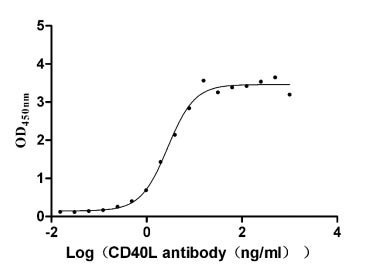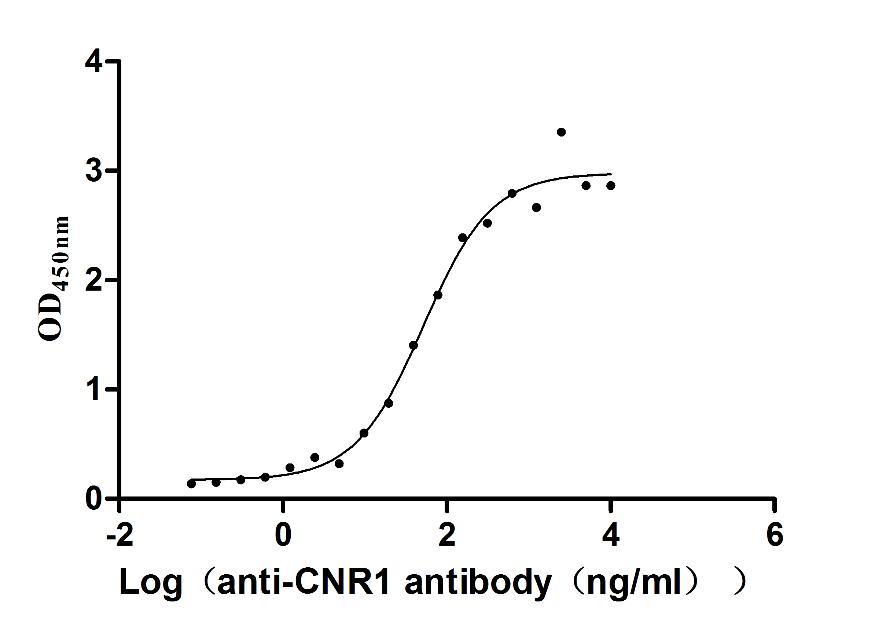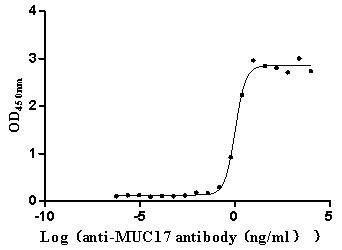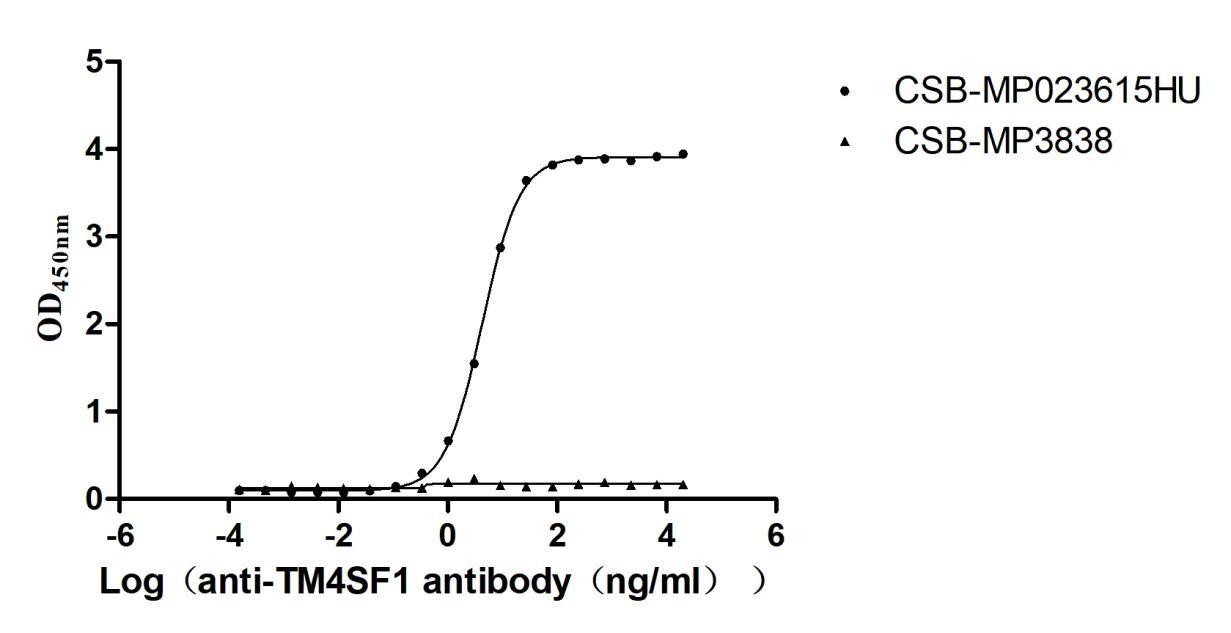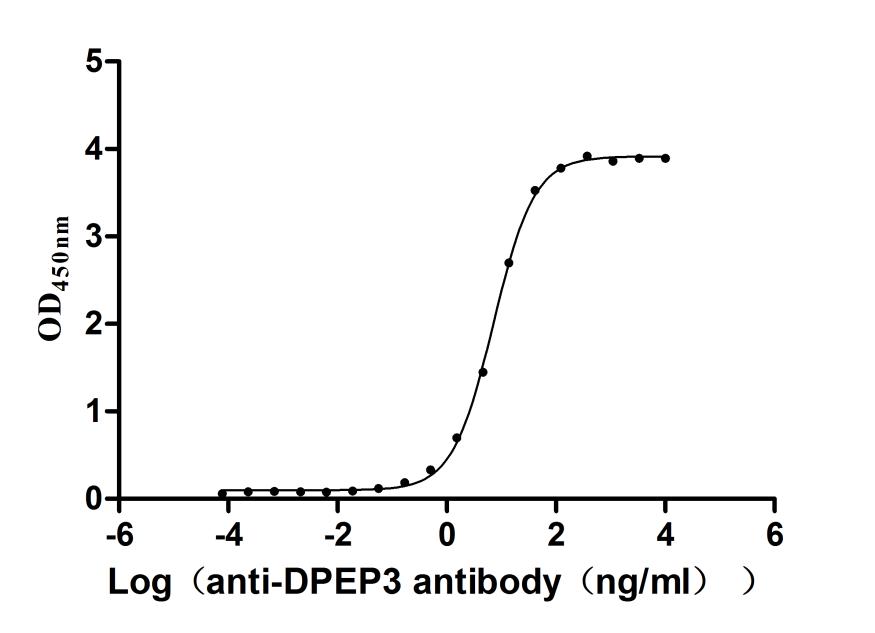Recombinant Mouse Neutrophil gelatinase-associated lipocalin (Lcn2)
-
货号:CSB-YP012816MO
-
规格:
-
来源:Yeast
-
其他:
-
货号:CSB-EP012816MO
-
规格:
-
来源:E.coli
-
其他:
-
货号:CSB-EP012816MO-B
-
规格:
-
来源:E.coli
-
共轭:Avi-tag Biotinylated
E. coli biotin ligase (BirA) is highly specific in covalently attaching biotin to the 15 amino acid AviTag peptide. This recombinant protein was biotinylated in vivo by AviTag-BirA technology, which method is BriA catalyzes amide linkage between the biotin and the specific lysine of the AviTag.
-
其他:
-
货号:CSB-BP012816MO
-
规格:
-
来源:Baculovirus
-
其他:
-
货号:CSB-MP012816MO
-
规格:
-
来源:Mammalian cell
-
其他:
产品详情
-
纯度:>85% (SDS-PAGE)
-
基因名:
-
Uniprot No.:
-
别名:Lcn2; Neutrophil gelatinase-associated lipocalin; NGAL; Lipocalin-2; Oncogene 24p3; 24p3; SV-40-induced 24p3 protein; Siderocalin LCN2; p25
-
种属:Mus musculus (Mouse)
-
蛋白长度:Full length protein
-
表达区域:21-200
-
氨基酸序列QDSTQNLIPA PSLLTVPLQP DFRSDQFRGR WYVVGLAGNA VQKKTEGSFT MYSTIYELQE NNSYNVTSIL VRDQDQGCRY WIRTFVPSSR AGQFTLGNMH RYPQVQSYNV QVATTDYNQF AMVFFRKTSE NKQYFKITLY GRTKELSPEL KERFTRFAKS LGLKDDNIIF SVPTDQCIDN
-
蛋白标签:Tag type will be determined during the manufacturing process.
The tag type will be determined during production process. If you have specified tag type, please tell us and we will develop the specified tag preferentially. -
产品提供形式:Lyophilized powder
Note: We will preferentially ship the format that we have in stock, however, if you have any special requirement for the format, please remark your requirement when placing the order, we will prepare according to your demand. -
复溶:We recommend that this vial be briefly centrifuged prior to opening to bring the contents to the bottom. Please reconstitute protein in deionized sterile water to a concentration of 0.1-1.0 mg/mL.We recommend to add 5-50% of glycerol (final concentration) and aliquot for long-term storage at -20℃/-80℃. Our default final concentration of glycerol is 50%. Customers could use it as reference.
-
储存条件:Store at -20°C/-80°C upon receipt, aliquoting is necessary for mutiple use. Avoid repeated freeze-thaw cycles.
-
保质期:The shelf life is related to many factors, storage state, buffer ingredients, storage temperature and the stability of the protein itself.
Generally, the shelf life of liquid form is 6 months at -20°C/-80°C. The shelf life of lyophilized form is 12 months at -20°C/-80°C. -
货期:Delivery time may differ from different purchasing way or location, please kindly consult your local distributors for specific delivery time.Note: All of our proteins are default shipped with normal blue ice packs, if you request to ship with dry ice, please communicate with us in advance and extra fees will be charged.
-
注意事项:Repeated freezing and thawing is not recommended. Store working aliquots at 4°C for up to one week.
-
Datasheet :Please contact us to get it.
相关产品
靶点详情
-
功能:Iron-trafficking protein involved in multiple processes such as apoptosis, innate immunity and renal development. Binds iron through association with 2,3-dihydroxybenzoic acid (2,3-DHBA), a siderophore that shares structural similarities with bacterial enterobactin, and delivers or removes iron from the cell, depending on the context. Iron-bound form (holo-24p3) is internalized following binding to the SLC22A17 (24p3R) receptor, leading to release of iron and subsequent increase of intracellular iron concentration. In contrast, association of the iron-free form (apo-24p3) with the SLC22A17 (24p3R) receptor is followed by association with an intracellular siderophore, iron chelation and iron transfer to the extracellular medium, thereby reducing intracellular iron concentration. Involved in apoptosis due to interleukin-3 (IL3) deprivation: iron-loaded form increases intracellular iron concentration without promoting apoptosis, while iron-free form decreases intracellular iron levels, inducing expression of the proapoptotic protein BCL2L11/BIM, resulting in apoptosis. Involved in innate immunity; limits bacterial proliferation by sequestering iron bound to microbial siderophores, such as enterobactin. Can also bind siderophores from M.tuberculosis.
-
基因功能参考文献:
- LCN2 influences peroxisomal and mitochondrial biology in the liver to maintain triglyceride balance, handle oxidative stress, and control apoptosis. PMID: 28396286
- High LCN2 expression is associated with stress-induced mitochondrial dysfunction and heart failure. PMID: 29378951
- Findings of the study revealed that Lcn2 prevents the development of spontaneous colitis in IL-10 deficient mice by enhancing phagocytic bacterial clearance in macrophages. The results clearly demonstrated a crucial role for Lcn2/NGAL in the development of intestinal inflammation by its regulation of mucosal innate immune responses toward enteric commensal bacteria. PMID: 27734904
- Results suggest that hippocampal LCN2 upregulation might be a potential pathogenic mechanism leading to further disruption of the hippocampus through neurotoxicity and neuroinflammation in vascular dementia (VaD). Astrocytes seem to be the major source of LCN2 in the hippocampus of rodent models and patients of VaD. Control of hippocampal astrocytic LCN2 expression or activity may be important for neuroprotection in VaD. PMID: 28581123
- Direct effects of LCN2 on cardiomyocyte size and number and the consistent associations in experimental and human analyses reveal a central role for LCN2 in the ontogeny of cardiac hypertrophy and heart failure PMID: 28615213
- the present study used an animal model to identify NGAL as a potential novel biomarker for mechanical-induced lung injury. PMID: 28393227
- Lipocalin-2 from both myeloid cells and the epithelium combats Klebsiella pneumoniae lung infection in mice. PMID: 28396494
- Knockout of Lcn2 attenuated tumor-associated lymphangiogenesis and breast tumor metastasis PMID: 27353364
- Overexpression of exogenous kidney-specific Ngal reduced cystic progression and prolonged the lifespan in polycystic kidney disease mice, and was associated with reductions in interstitial fibrosis and proliferation, and augmented apoptosis. PMID: 28341240
- Either Lcn2 deficiency or anti-Lcn2 antibody blockade limits abdominal aortic aneurysm expansion in mice by decreasing neutrophil infiltration in the aorta. PMID: 27229458
- Results suggest that blood brain barrier leakage occurs in white matter after subarachnoid hemorrhage (SAH) and that LCN2 contributes to SAH-induced blood brain barrier disruption. PMID: 26463936
- LCN2 overexpression in bones modifies the bone marrow microenvironment via modulation of the expression of key secreted factors and cytokines, which in turn regulate the hematopoietic stem cell niche behavior enhancing both HSC homing in young mice and erythrocytes production in older mice. PMID: 28004388
- LCN2 modulated the secretion of proinflammatory cytokines in PSC of the PDAC tumor microenvironment, whereas downregulation of LCN2-specific receptor SLC22A17 blocked these effects. Our results reveal how LCN2 acts in the tumor microenvironment links obesity, inflammation, and PDAC development. PMID: 28249896
- results identify lipocalin 2 as a bone-derived hormone with metabolic regulatory effects, which suppresses appetite in a MC4R-dependent manner, and show that the control of appetite is an endocrine function of bone PMID: 28273060
- Lcn2 can suppress the beneficial cardiac autophagic response to ischemia and that this contributes to enhanced ischemia-induced cell death and cardiac dysfunction. PMID: 27800610
- Plasma levels of LCN2 measured in patients one week after ischemic stroke contribute to the prediction of clinical outcome at 90 days and reflect the systemic response to post-stroke infections PMID: 27152948
- may potentiate the development of psoriasis via the enhancement of Th17- and antimicrobial peptide-mediated inflammation PMID: 26702876
- The acute stress protein LCN2, produced from RPE cells and the neural retina, could modulate retinal inflammation and retinal homeostasis; therefore, such families of proteins could contribute to cell survival during retinal insults. PMID: 27315541
- Stroma-secreted Lcn2 promotes metastasis in vitro and in vivo, thereby contributing to tumor progression. PMID: 27038000
- study demonstrated a pivotal and causal role of LCN2 in the development of alcoholic fatty liver disease PMID: 27427417
- The basic residues Lys-717 and Lys-719 in the C-terminal region of ANK7 contribute to IkappaBzeta binding to the Lcn2 promoter, probably via interaction with the cytosine-rich element required for Lcn2 activation; glutamate substitution for both lysines results in a loss of transcriptionally active complex formation without affecting direct contact of IkappaBzeta with p50. PMID: 27489104
- The expression of Lcn2 and mPGES-1 is strongly stimulated by lipopolysaccharide (LPS), indicating that Lcn2 mediates LPS-induced inflammation. These findings shed light on the role of Lcn2 during decidualization. PMID: 27416888
- Dietary curcumin ameliorates western diet-induced atherosclerosis in ApoE-/- mice, which is related to LCN2 down-regulation, anti-hyperlipidemia effect as well as the inhibition of inflammation. PMID: 28234242
- Urinary L-FABP, NGAL, Kim-1 and albumin levels increased during the acute phase of kidney injury and were significantly correlated with the degree of tubulointerstitial fibrosis during the chronic phase. These markers could detect higher risk of progression to CKD. PMID: 27028054
- LCN2 drives ethanol-induced neutrophilic inflammation and propagates the development of alcoholic liver disease. PMID: 26682726
- Lcn2 protects against intestinal inflammation and tumorigenesis associated with alterations in the microbiota. PMID: 27078067
- Loss of Lipocalin 2 is associated with Acute Rejection in a Mouse Model of Renal Transplantation. PMID: 26595644
- Lcn2 KO mice have decreased levels of retinoic acid and retinol in adipose tissue. The protein levels of STRA6 responsible for retinol uptake were significantly decreased in adipose tissue. The retinol transporter RBP4 was increased in adipose tissue but decreased in the circulation, suggesting the impairment of RBP4 secretion in Lcn2 KO adipose tissue. PMID: 27008859
- The ability of EGCG to mediate its inhibitory activity is counter-regulated by the presence of iron and lipocalin 2 PMID: 26968114
- Thrombin upregulates LCN2 through protease-activated receptor-1 activation and causes brain damage. PMID: 26869387
- Urine/plasma NGAL expression ratio is a sensitive and specific marker of subclinical acute kidney injury in mice. PMID: 26824608
- This study demonstrated that up-regulation of miR-138 inhibits the hypoxia-induced cardiomyocyte apoptosis via down-regulating the pro-apoptotic gene expression of Lcn2. PMID: 26129883
- Data show that albumin induces tubular unfolded protein response via cytosolic calcium rise, which leads to tubular apoptosis by Lipocalin 2 (LCN2) modulation through ATF4 PMID: 26787103
- LCN2 plays a pivotal role in processes involved in atherogenesis by promoting polarization and migration of monocytic cells and development of macrophages towards foam cells. PMID: 26367277
- Our observations suggest that Lcn2 promotes host resistance to Salmonella Typhimurium infection PMID: 26332507
- LCN2 is a neurotoxic factor secreted rapidly in response to cerebral ischaemia. PMID: 25702801
- PKCdelta phosphorylated LCN2 at T115 and this phosphorylation was reduced in Prkcd (-/-) mice. PKCdelta colocalized with LCN2 in resting and stimulated neutrophils. LCN2 release from neutrophils after cerebral ischemia was reduced in PKCdelta null mice. PMID: 25890235
- LCN2 is a novel osteoblast mechanoresponding gene. PMID: 25112732
- Lcn2 expression is highly regulated during cecal ligation and puncture-induced sepsis, suggesting that this antimicrobial protein could have a role as a potential biomarker for the diagnosis of sepsis PMID: 25227123
- NGAL has a role in inflammation during sepsis PMID: 25893429
- LCN2, although massively induced in mice after PH, is not relevant in murine hepatic regeneration. PMID: 25040147
- Increased LCN2 protein levels in the plasma of mice bearing hypoxic tumors suggest Lipocalin2 may be a useful plasma tumor marker. PMID: 25467539
- Overall, MSCs by innate tropism toward cancer cells can deliver the therapeutic agent, Lcn2, and inhibit cancer metastasis PMID: 25740061
- These results suggest a role of LCN2 in enhancing brain injury and iron toxicity after ICH. PMID: 25853903
- neutrophils are the major source of circulating LCN2 in normal and infected conditions PMID: 24599361
- Lcn2 loss prevented the NAS-induced increase of PINP, prevented the increase of collagen fibers deposition and collagen I expression in the coronary vessels and the aorta, and blunted the NAS-induced increase in systolic blood pressure. PMID: 25987661
- Lcn2 is the key secreted factor downstream of Tcf3 that promotes cell migration in vitro and wound healing in vivo. PMID: 24909826
- an important role of Lcn2 in adipocyte metabolism and inflammation PMID: 24818605
- amyloid beta toxicity to astrocytes requires LCN2, which represents a novel mechanism to target when addressing Alzheimer's disease. PMID: 24853299
- Lcn2 plays a role as an anti-inflammatory regulator in macrophage activation via modulating a feed-forward activation of NFkappaB-STAT3 loop. PMID: 25127375
显示更多
收起更多
-
亚细胞定位:Secreted. Cytoplasmic granule lumen. Cytoplasmic vesicle lumen.
-
蛋白家族:Calycin superfamily, Lipocalin family
-
组织特异性:Detected in lung, spleen, uterus, vagina and epididymis.
-
数据库链接:
KEGG: mmu:16819
STRING: 10090.ENSMUSP00000053962
UniGene: Mm.9537
Most popular with customers
-
Recombinant Human CD40 ligand (CD40LG), partial (Active)
Express system: Mammalian cell
Species: Homo sapiens (Human)
-
Recombinant Human Cannabinoid receptor 1 (CNR1)-VLPs (Active)
Express system: Mammalian cell
Species: Homo sapiens (Human)
-
Recombinant Human Mucin-17 (MUC17), partial (Active)
Express system: Mammalian cell
Species: Homo sapiens (Human)
-
Recombinant Human Transmembrane 4 L6 family member 1(TM4SF1)-VLPs (Active)
Express system: Mammalian cell
Species: Homo sapiens (Human)
-
Recombinant Human Dipeptidase 3(DPEP3), partial (Active)
Express system: Mammalian cell
Species: Homo sapiens (Human)
-
Recombinant Human Cadherin-1(CDH1),partial (Active)
Express system: Mammalian cell
Species: Homo sapiens (Human)


